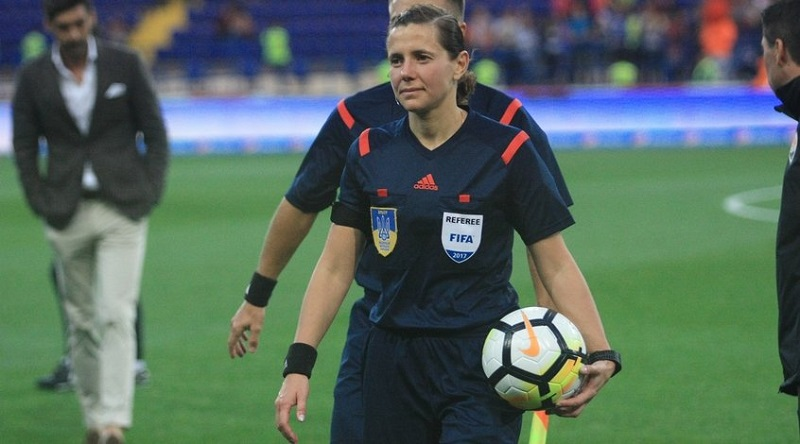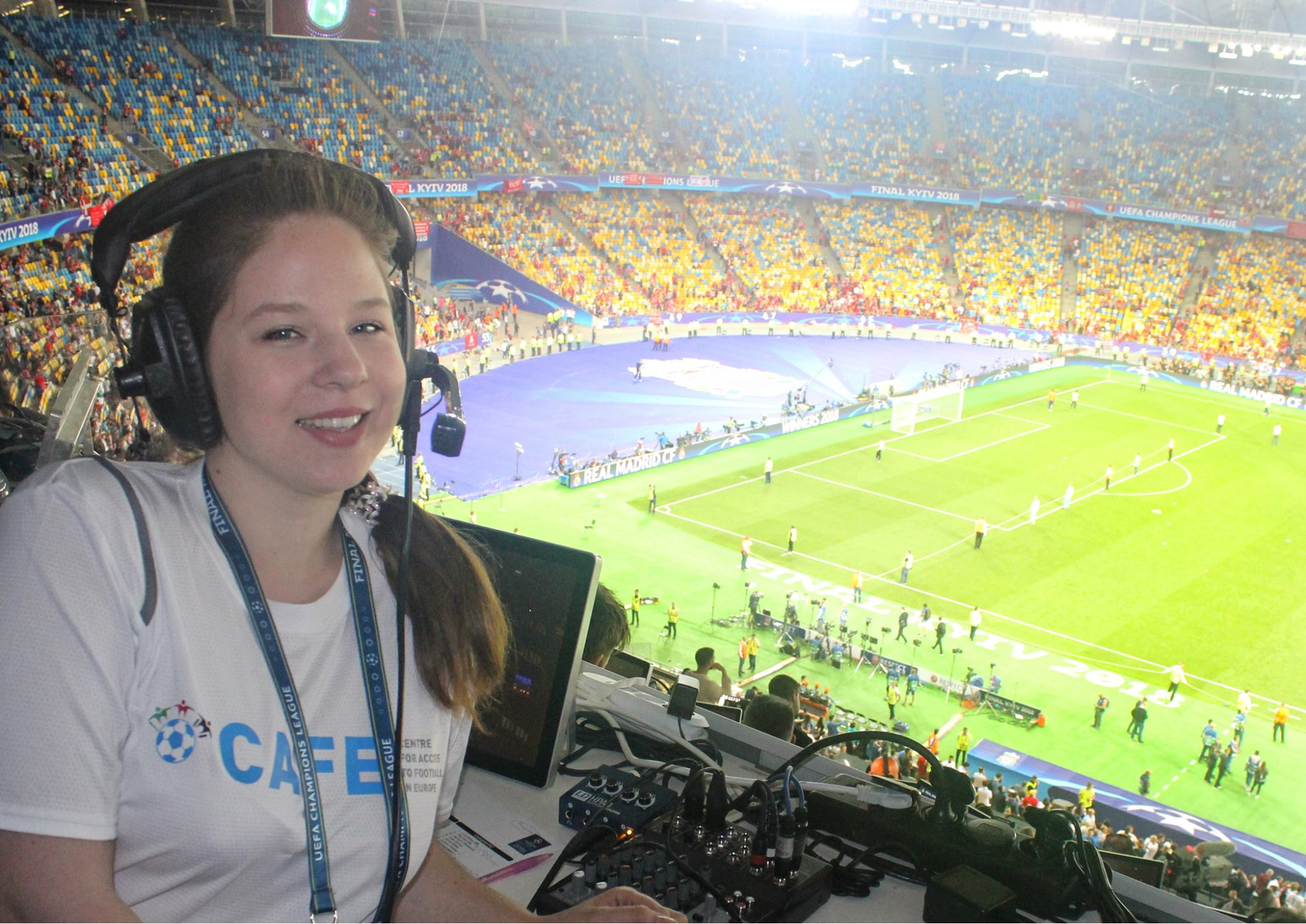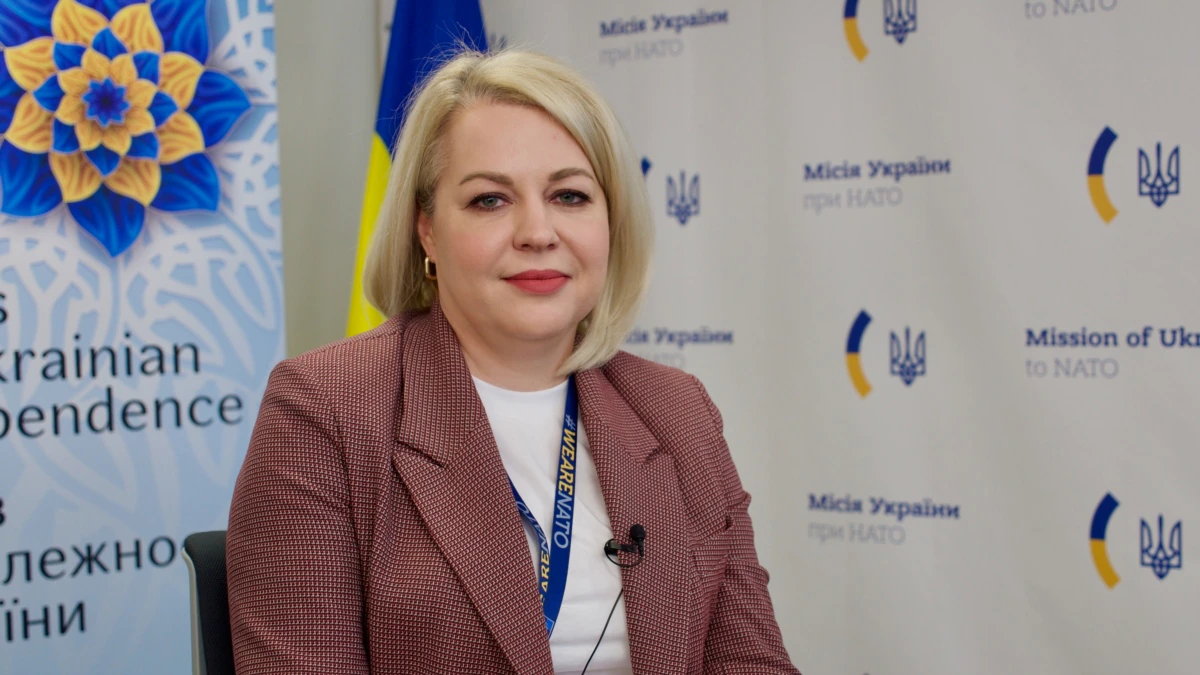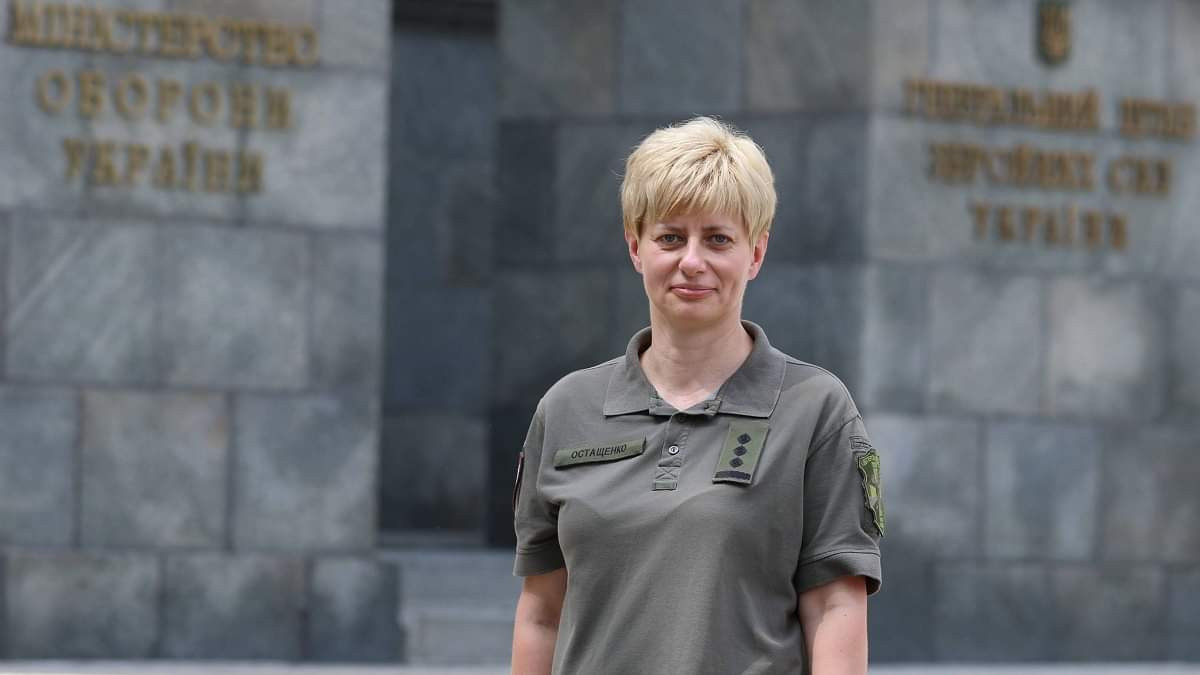Breaking the glass ceiling: 5 stories of Ukrainian women who break stereotypes in "male" professions
Football commentator, referee, conductor, diplomat, and military commander: Ukrainian women prove nothing is impossible!
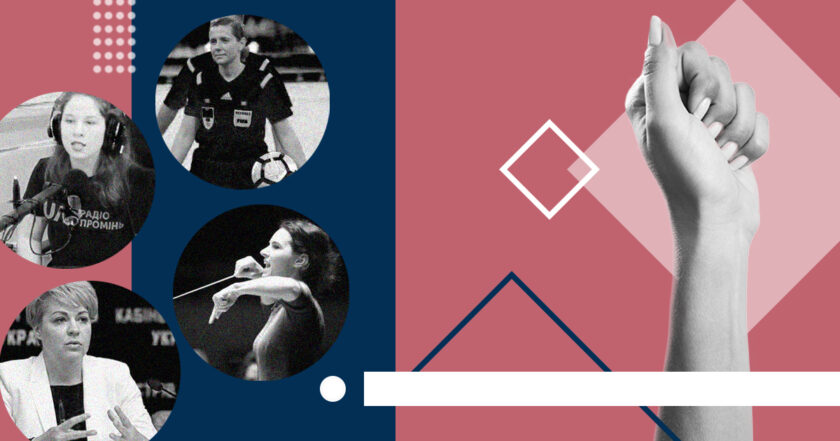
What is the problem?
The struggle of women for the right to be equal with men has been going on for more than a hundred years. Despite the significant achievements of feminism, there are still certain areas where men are reluctant to "let women in," almost gritting their teeth. This applies to top management positions, the army, politics, IT, and even the seemingly long-held progressive world of music.
"Glass ceiling" is a term used to describe the phenomenon of unfair distribution on the career ladder, where women seem to push against the invisible ceiling and can not rise higher. Women from "non-female professions" suffer the most from the glass ceiling.
What is the solution?
One of the tasks of feminism is to refute the patriarchal idea that to succeed in life and achieve the mythical "female happiness," a woman needs love and family (and, perhaps, a little job to her heart's content). And a career, even in "male" professions, is secondary or even completely harmful. Yes, it is still difficult for women to make a career in many fields, and all over the world, including Ukraine, women receive significantly lower salaries than men.
Of course, not all women need to be radical feminists. And feminism itself has no task to impose anything on women. On the contrary, its goal is to get rid of any walls and ceilings in the way of women, to give them the opportunity to choose their own life scenarios and have the conditions for its implementation. Just like it happens with men.
How does it work?
The best way to prove to society that the division into "male" and "female" professions is artificial is to show by your own example that women can do anything.
Women, who are not afraid of any glass ceiling, not only compete with men on an equal footing but also honestly defeat them. It is especially gratifying that these women are our compatriots.
And did they succeed?
Conductor Oksana Lyniv: it all depends on your professionalism, dedication to work, and desire to constantly become better
If you look at the composition of famous symphony orchestras, you can see a lot of musicians there, but it's not so easy to make a career as a conductor, because men are usually chosen for this position.
Oksana Lyniv was born in Brody, Lviv Region, and studied at the Lysenko Music Academy in Lviv. While studying at the music academy, Oksana received a flyer about the world competition for young conductors, which took place in the German city of Bamberg (2004). And although the professors advised the students not to pay attention to this competition (because, they say, Ukrainians are still not a competition, no one will consider their applications), she decided to take part in it. This moment was a turning point in the life of the future world-famous conductor. As a result, out of 456 contenders, Oksana Lyniv became one of the 16 contestants of the Bamberg Competition and the only woman who made it to the finals and took third place. This victory was the first real triumph in Oksana's life.
In all subsequent years, the phrase "for the first time" constantly accompanies the talented musician. For the first time, she gets a permanent job as a conductor in Odessa,. In 2013, Lyniv was invited to Munich to assist the director of one of the top 7 operas in the world, and in 2015 Oksana was recognized as the best conductor of this opera. Proposals to work with one or another team come one after another! But the most attractive was the invitation from Graz, the second opera from Austria after Vienna. Here Lyniv became not only the first Ukrainian to become the chief conductor of the Graz Opera; she was the first woman to succeed.
Last year, Ukrainian Oksana Lyniv became the first woman to conduct an orchestra in the 145-year history of the Bayreuth Opera Festival in Germany; the first woman to receive an offer to become musical director of the Teatro Comunale, an opera house in Bologna, one of Italy's leading state theaters; and in January of this year, she became the first woman chief conductor.
"I never imagined that I would be the first woman to become a principal conductor at the Italian Opera House. It is an honor for me and I am very happy to be a part of this turning point in history," Lyniv said.
Referee Kateryna Monzul: there is no significant difference between women's and men's football
Kateryna Monzul is the most relevant and discussed arbiter of Ukraine and has the status of one of the best among Ukrainian colleagues.
Monzul comes from the village of Babai near Kharkiv. The house where she grew up stood next to the stadium, so the girl spent her childhood on the football field. She played indoor soccer, watched the championships on TV with enthusiasm, and later began to play for her native Babai, and as part of the men's team. She clung to football so much that she decided to connect her life with it, if not as a player, then as a referee.
In 2000, Kateryna made her debut. "The first year I refereed at сhildren's and youth sports school. The next stage was the All-Ukrainian youth competitions, at the same time I refereed women's football. Later I received a recommendation for amateurs, and then the second league. The first year I worked as an assistant referee," Monzul told about her start of the referee path. And it was quite fast. In 2004, when Kateryna was just starting to play in the second league, the FFU Referees Committee recommended that she be included in the list of FIFA international referees from Ukraine. To date, no incumbent Ukrainian female referee has earned this status faster than Monzul. She is also the longest-serving international referee of our active referees, both men and women.
Not all her colleagues liked Kateryna Monzul's fast ascent. Some simply feared that the woman might move male referees, others argued that the woman was not yet ready for a full-fledged international career, and others didn't understand "how a woman can referee football." However, Monzul refereed her first international match in 2005, and in 2010 she won a football tournament at her debut Youth Olympics in Singapore. In 2015, at the Canadian Women's World Cup, Monzul refereed several matches, including the final. That same year, the renowned IFFHS Center for History and Statistics named Monzul the best female referee in the world.
She entered the history of Ukrainian football as the first woman to be the main referee of a men's Premier League match in Ukraine.
In 2021, for the first time in the history of the World Cup matches for men, women began to referee. They were Frenchwoman Stéphanie Frappart and Ukrainian Kateryna Monzul.
Football commentator Halyna Vinichenko: for the first time it's always scary
Halyna Vinichenko is a sports journalist and commentator on gymnastics and figure skating. But during Euro 2020, she retrained, and even more so, for the first time on the Ukrainian air, men's football battles were voiced by a woman.
Vinichenko's debut as a football commentator took place during the match between the teams of Hungary and Portugal. But her love for football began in childhood. Dad taught Halia to watch and understand the game. It was he who encouraged his daughter to take up football.
According to Halyna, at the age of 12, she first felt euphoric when the team she supported won. And a year later in the life of the girl, a real football mania began. In 2006, Ukraine went to the FIFA World Cup for the first time, the Vinichenko family watched all the matches, and when our players scored, Halya was the happiest, jumping to the ceiling in delight. "Later, I started watching almost everything that was broadcast on the Football channel, bought all the issues of the Football magazine and professional encyclopedias, was interested in history. It became a mania, in a good way," says Vinichenko.
The idea to hire a commentator for Euro 2020 belonged to the management of Radio Promin, Vinichenko's candidacy was proposed to the management by her colleague and broadcast partner Vadym Vlasenko. "Before the first broadcast of the football match, I had a mandrake," recalls Halyna, "because I have commentary experience in sports where the audience is more female (gymnastics and figure skating). Football has a much larger male audience, so I was worried that I could catch a wave of hatred after which I couldn't continue working normally, but it seems that everything went well, at least the vast majority of listeners gave positive feedback. for the first time, it's always scary, that's why I'm happy I can work further and improve."
As Vinichenko admits, until last year it seemed to her that a woman commenting on football was unrealistic. But her experience shows that it is still possible! The referees who were not accepted immediately were a good example for the commentator, but now they are perceived as an organic part of football.
"I'm glad that now I have the opportunity to professionally apply all my many years of football passion and knowledge. It seems that dreams come true when you start to forget about them. I want to say to women who doubt: no matter how crazy you may think your dream is, it can come true if you want it with all your heart and work hard. Yes, at some point it may seem unrealistic, but when you are ready to forget about your dream, there will be an opportunity to realize it. I checked on my own experience," the football commentator says.
Diplomat Natalia Halibarenko: nothing about Ukraine without Ukraine
From July 30, 2021, the Mission of Ukraine to NATO will be headed by diplomat Natalia Halibarenko. She became Ukraine's first full-fledged ambassador to the North Atlantic Alliance in 2019. Halibarenko is also the first woman in this position.
Natalia Halibarenko graduated from the Institute of International Relations of the Taras Shevchenko National University of Kyiv. She began her diplomatic career in 2000, serving as Attaché and Third Secretary of the Cabinet of the Minister of Foreign Affairs of Ukraine, Third and Second Secretaries of the Mission of Ukraine to the EU. Since 2015, she has held the position of Ambassador Extraordinary and Plenipotentiary of Ukraine to the United Kingdom, which she combined with the work of the Permanent Representative of Ukraine to the International Maritime Organization. Natalia Halibarenko currently has more than 20 years of diplomatic service behind her. And the fact that Europe no longer believes that Kyiv is somewhere near Moscow is the merit of this diplomat.
"A lot is known about Ukraine, and this was facilitated, in particular, by the fact that we held Eurovision and the Champions League final. That is, such things are broadening the understanding of Ukraine. However, I need to admit most associations are connected with the fact that we have a war with Russia, and many ordinary people react to you mentioning that you are from Ukraine: 'Oh, yes, you have a war.' Unfortunately, this is the reality. On the other hand, realizing that we have a war with Russia, not a civil war, I believe, is positive, because in some European countries even this is perceived ambiguously," Halibarenko said in an interview.
The position of Head of the Mission of Ukraine to NATO has been vacant since August 2019. Among other candidates, Halibarenko was elected by the country's leadership. First of all, because this strong-willed woman is a true professional, has the vast diplomatic experience and a stable position. In her current position, Natalia Halibarenko is guided by the principle: "Nothing about Ukraine without Ukraine." It remains fundamental for Ukraine's ambassador to NATO. Experts believe that Natalia Halibarenko will be able to continue our course in the direction of NATO integration.
Brigadier-General Tetiana Ostashchenko: you have to be twice as good as a man
A woman in the army has long been perceived as a challenge (in many armies, people are not surprised at women even at the helm of a ship). Currently, more than 280,000 women serve in the armies of the North Atlantic Treaty Organization. Most of them are in the USA (14%), Canada (11.4%), Great Britain (9%), and in Israel, in general, 34% of the IDF members are women. Ukraine is also already accustomed to the mass desire of Ukrainian women to serve in the army. But women are still very rare in the Ukrainian high command.
Military medic Tetiana Ostashchenko, like icebreakers, clears the way for Ukrainian feminism in the army: in July 2021 she became the first woman to head one of the commands in the Armed Forces of Ukraine (namely the Medical Forces of the Armed Forces), and a month later, the first woman to receive the rank of brigadier general in the Armed Forces.
Tetiana Ostashchenko was born in August 1974 in Lviv to a military family. She graduated with honors from the Faculty of Pharmacy of the Lviv State Medical Institute, as well as the Ukrainian Military Medical Academy. In the Armed Forces of Ukraine, she went from the head of a pharmacy in the military unit to the chief inspector of the Main Inspectorate of the Ministry of Defense.
"My first military experience was really difficult," Tatiana Ostashchenko recalled in an interview. "I remember coming to the place of service and the face of my first commander, who said, 'I knew a new chief would come. But I didn't expect that.' The main thing I realized during my work was that you have to be twice as good as a man. And that's all."
After signing the Order appointing Tetiana Ostashchenko, then Colonel of the Medical Service, Commander of the Medical Forces of the Armed Forces of Ukraine, Minister of Defense Andrii Taran said: "For the first time a woman heads one of the Commands in the Armed Forces of Ukraine. We're gradually moving to build the Armes Forces of a new style. Reforming the army in line with NATO principles and approaches now gives women the opportunity to serve in the military on an equal footing with men." In his opinion, such an appointment of the Commander of the Medical Forces of the Armed Forces of Ukraine is not only about gender equality, but, above all, about professionalism. After all, in a professional army, along with patriotism and moral qualities, the qualification must come first.
Ostashchenko herself is convinced: "It is important for the army to have women in its ranks because they have a different outlook on life. From what I see the presence of women improves efficiency and discipline, encourages smarter resolution of conflicts and crises. Women can do exactly the same work as men."
Even more useful solutions!
UN Women has launched a campaign to draw attention to the glass ceiling for women in "male" professions. You need to find a woman on the poster in the style of a child's picture for attention training. Can you?
In general, it is gratifying to note that in recent years the list of purely "male" industries that have undergone active women's "invasion" has expanded significantly. This is a global trend, and Ukraine is part of this global process. Here are just a few examples of women proving once again that they can do anything:
- Keechant Sewell will be the first woman to head the New York City police.
- Franziska Giffey, the family's former minister, is the first woman in history to become mayor of Berlin.
- The Louvre, one of the largest museums in the world, located in Paris, for the first time in 228 years of existence will be headed by a woman, Laurence des Cars.
- Kathleen Hicks became the second person in the Pentagon to be the first woman to become deputy defense minister.
- For the first time in history, the world trade organization is headed by a woman, represented by Ngozi Okonjo-Iweala from Nigeria.
- For the first time in history, a woman, Magdalena Andersson, became the Prime Minister of Sweden.
- In May 2021, for the first time in its history, the Ivan Bohun Military Lyceum graduated 18 girls who successfully completed a two-year training course at the lyceum.
This is just some of the recent news in which the words "woman" and "first time" stand side by side. Although it's the 21st century, for women many events are still happening for the first time. Can feminists finally breathe a sigh of relief? Probably not yet, but there are already many examples that give reason to be sure: women have a place everywhere, we'll see more further.



